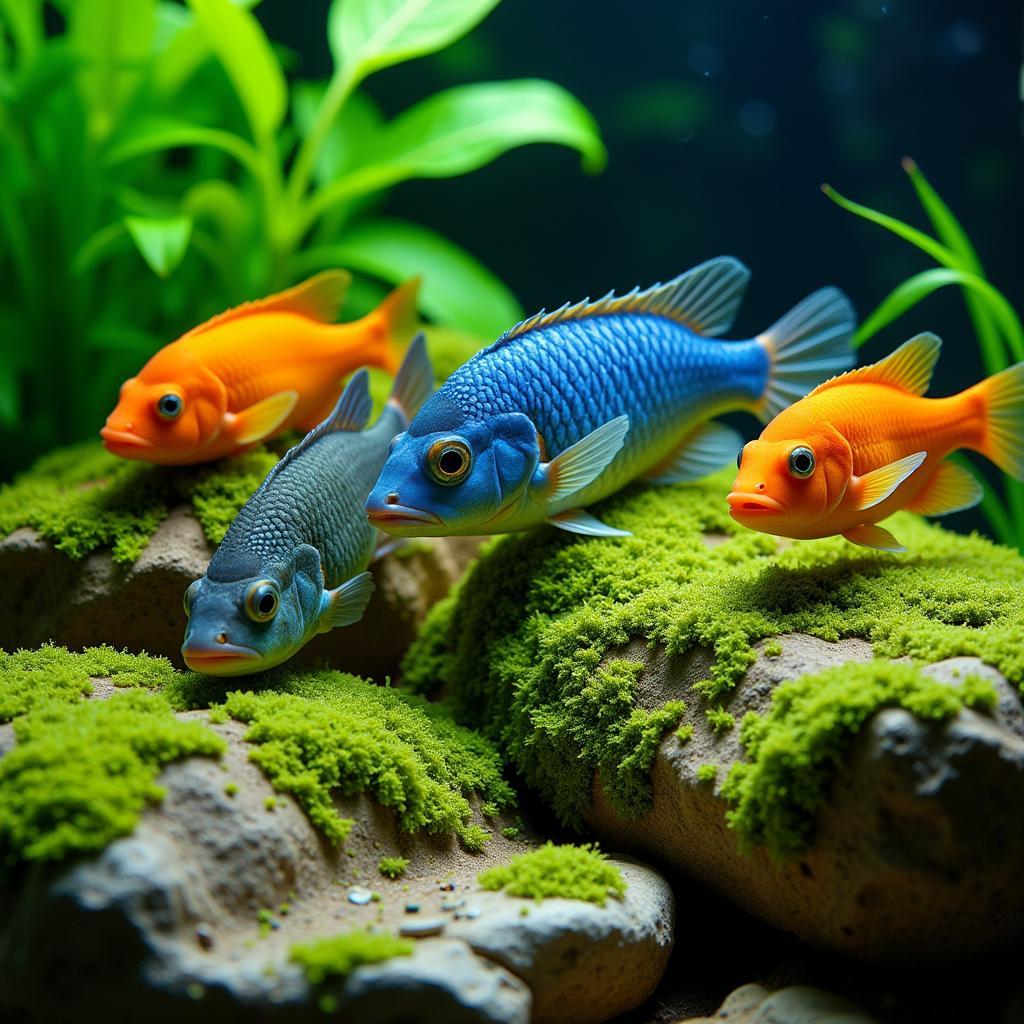Herbivore Fish Food is essential for the health and wellbeing of many popular aquarium species. Understanding their dietary needs is crucial for maintaining a vibrant and thriving tank. From the basics of plant-based diets to specialized options for specific species, this guide will explore everything you need to know about herbivore fish food.  A school of herbivore fish consuming algae in a planted aquarium
A school of herbivore fish consuming algae in a planted aquarium
Understanding the Herbivorous Diet
Not all fish are created equal when it comes to their dietary needs. While some fish thrive on a meat-based diet, herbivores require a primarily plant-based food source. These fish have evolved digestive systems specifically designed to process plant matter efficiently. This often involves longer intestines to break down cellulose and other tough plant fibers. Providing them with the right herbivore fish food ensures they receive the essential nutrients, vitamins, and minerals needed for optimal growth, color, and overall health.
Why Choose Specialized Herbivore Fish Food?
Offering your herbivore fish a diet specifically formulated for their needs is crucial for several reasons. First, it provides the correct balance of nutrients. Commercial herbivore fish food often contains a blend of algae, spirulina, kelp, and other plant-based ingredients, ensuring a complete and balanced nutritional profile. Secondly, specialized food helps prevent digestive issues. Feeding herbivorous fish a meat-based diet can lead to digestive problems and even malnutrition. Finally, the right food enhances their coloration. Many herbivore fish display vibrant and beautiful colors, and a diet rich in plant-based nutrients helps maintain these striking displays.
Types of Herbivore Fish Food
Choosing the right type of herbivore fish food can sometimes feel overwhelming. The options available range from flakes and pellets to wafers and even fresh vegetables. Flakes are a popular choice for smaller herbivores, while pellets are often preferred for larger fish. Wafers are excellent for bottom-dwelling species like plecos, providing a readily available food source. Furthermore, supplementing their diet with fresh vegetables like blanched spinach or zucchini can offer additional nutrients and variety. Check out our guide on the best food for cichlid for more information on specialized diets.
What to Look for in High-Quality Herbivore Fish Food
When selecting herbivore fish food, there are several key factors to consider. Look for foods with high-quality ingredients like spirulina, kelp, and other algae-based components. Avoid foods with fillers or artificial ingredients, as these can be detrimental to your fish’s health. Also, consider the form of the food and choose one that is appropriate for the size and feeding habits of your fish. For instance, smaller fish might prefer flakes, while larger fish might benefit from pellets or wafers. You can also explore our range of aquaria food for more options.
Feeding Schedule and Portion Control
Establishing a consistent feeding schedule and practicing proper portion control is vital for the health of your herbivorous fish. Overfeeding can lead to water quality issues, while underfeeding can result in malnutrition. As a general rule, feed your fish only what they can consume within a few minutes, once or twice a day. Observe their feeding behavior and adjust the amount accordingly. Remember, it’s always better to slightly underfeed than to overfeed.
How Often Should I Feed My Herbivore Fish?
The ideal feeding frequency depends on the species of fish, their age, and the specific tank environment. However, feeding your herbivorous fish once or twice a day is typically sufficient. Remember to monitor your fish for signs of overfeeding or underfeeding and adjust the schedule accordingly. For more tips on feeding freshwater fish, check out our guide on the best freshwater fish food.
Common Mistakes to Avoid
Many common mistakes can hinder the health and well-being of herbivore fish. One of the most frequent errors is overfeeding, leading to poor water quality and potential health issues. Another mistake is offering an inappropriate diet, such as feeding a meat-based diet to a herbivore. Finally, neglecting to provide variety in their diet can also lead to nutritional deficiencies. You can explore more on specialized diets in our guide on exotic pet food. Furthermore, understanding the food chains and food webs what’s for dinner can provide a broader perspective on the dietary needs of different species.
Conclusion
Choosing the right herbivore fish food is a critical aspect of maintaining a healthy and thriving aquarium. By understanding the specific dietary requirements of your herbivore fish and offering a balanced and nutritious diet, you can ensure their vibrant colors, optimal growth, and overall well-being. Remember to choose high-quality food, establish a consistent feeding schedule, and avoid common mistakes like overfeeding and offering inappropriate food choices.
FAQ
- What is the best type of herbivore fish food?
- How often should I feed my herbivore fish?
- Can I feed my herbivore fish vegetables?
- What are the signs of overfeeding?
- What are the signs of underfeeding?
- How do I choose the right herbivore fish food for my fish?
- What are the benefits of feeding specialized herbivore fish food?
When you need support, please contact Phone Number: 02437655121, Email: minacones@gmail.com Or visit us at: 3PGH+8R9, ĐT70A, Trung village, Bac Tu Liem, Hanoi, Vietnam. We have a 24/7 customer service team.